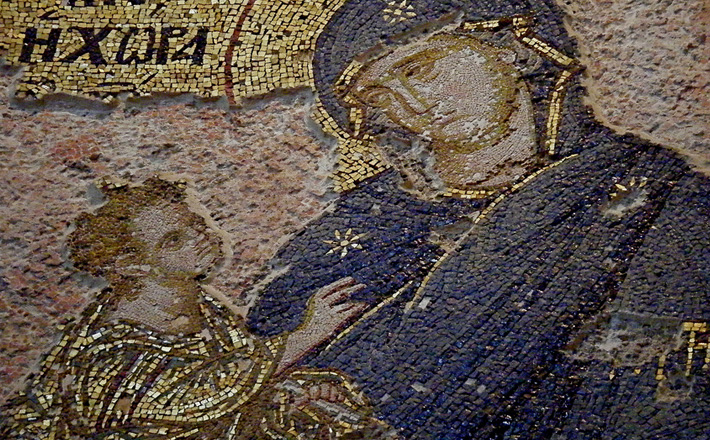Commentary on Isaiah 9:2-7
The words of Isaiah 9, immortalized by the great George Frideric Handel, are linked forever for most Americans to the holiday of Christmas.
But the theme of great light and Wonderful Counselor carry resonances that reverberate throughout Israelite history, in ways that can deepen the impact of these words for all hearers on December 24th.
“Great light” is actually a theme continued from the chapters before. In Isaiah 7, God offers to all of Israel a prophetic sign of peace in the face of imminent political disaster from conquering nations. This sign is the birth and name of an actual child, Immanuel, Hebrew for “God-Is-With-Us.” This child is meant to be a physical sign of God’s intimate presence and a theological assurance that no disaster will befall Jerusalem. But the frightened and faithless king ultimately rejects it, and with it, God’s saving help. Then we learn in Isaiah 8:19-20 that the people are instead rousing dead spirits to ask them for help.
The people and the king have literally rejected God’s offer of life in favor of the dead. And God has had it.
The one who does this, God states, will look up to heaven or down to earth, “but will see only distress and darkness, gloom and anguish; into thick darkness, they will be thrust” (Isaiah 8:22). Isaiah 8 seems determined to shove any hope of redemption into the dimmest corner of possibility.
But then, two verses later — floodlights: “The people who walked in darkness / have seen a great light; those who lived in a land of deep darkness — on them light has shined” (Isaiah 9:2). The nation which caused divine revulsion in Isaiah 8 is showered with joy — big joy — REALLY big joy — in Isaiah 9:2. Joy as at a successful harvest, joy as at heaps of plunder, joy, we hear in verse 3, as at freedom from the oppressors of Midian.
Now Midian is a reference which means nothing to us, but it would have meant something special to the Israelites. Midian was the national and religious equivalent of something like Independence Day and the Emancipation Proclamation rolled into one. Judges 6 narrates the oppression of the Israelites by surrounding nation-states, described poetically in Isaiah 9 as a yoke on their back, a bar on their shoulders, a rod of an oppressor. Judges 7 describes the battle that changes all of that.
A warrior named Gideon (think a kind of Israelite amalgamation of Frederick Douglass and George Washington) rallies 32,000 of Israel’s troops to fight the nation-states which have been oppressing Israel — Midian most of all. God promises Gideon that they will win the day, but also informs him that it must be abundantly clear that the victory is God’s and God’s alone. So, three different times, God makes Gideon winnow down the troops. Ultimately, all that remains of the original 32,000 are 300 fighters. That night, Gideon gives each soldier a horn, a jar, and a covered torch. They surround the enemy camp, and then simultaneously blow their horns, break their jars, and uncover their torches, so that it seems that the Israelites are bringing a seriously coordinated attack. The Midianites, in short, lose it. They panic, and in their disarray, end up fighting and killing each other, handing the victory to Israel and to God. The day of Midian was a day of salvation in a most decisive fashion.
In Isaiah 9, the people stumbling about in deep darkness are now delivered as on one of Israel’s greatest victories. But note carefully verse 6: it is no Frederick Douglass orator or George Washington commander who brings this triumph about. Instead it is a child, born to a people, with authority — not oppression — resting on his shoulders. More, it is a child who has been named not Great Warrior, but Wonderful Counselor, Everlasting Father, Prince of Peace. The day of Midian is flipped on its head. The authority of this child shall grow not in conquest but in endless peace, established and upheld with justice and with righteousness, from this time on and forevermore.
This child — Hezekiah, the son of King Ahaz — will enter into a theologically failed and chaotic kingdom and turn it on its head. (Remember, Ahaz refused to rely on God’s help but reached out to oppressive political empires instead — see my earlier commentary on Isaiah 7 for Dec. 22nd). And Hezekiah does lead in marvelously faithful ways, trusting in God’s salvation even as Jerusalem is surrounded and besieged by King Sennacherib of the empire of Assyria — surrounded and besieged, but not taken. And it is the word of God from Isaiah son of Amoz which steels the king’s nerves long enough to see God’s deliverance of Jerusalem (see Isaiah 36-37 and 2 Kings 18-19).
But while the prophetic oracle of Isaiah 9 may begin with King Hezekiah, it does not end there. Peace prevailed during Hezekiah’s time, but disaster loomed, and indeed, later struck with a vengeance. Over the centuries, empires came and went (Assyria, Babylon, Persia, Greece, Rome), but their oppressive practices remained the same, up to and including empires of today. So as Christians, we read this text on Christmas in defiance of the decrees of Emperors, past, present, and future. We read this text in rejection of those who seek to count, to categorize, to control, in the vein of Emperor Augustus. We read this text in the hope of a child, a child who will take our days of Midian and turn them on their heads; a child who will break the oppressive bars of terrorists and of tyrants; a child who will rule with justice and righteousness from this time on and forevermore.


December 24, 2019